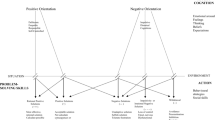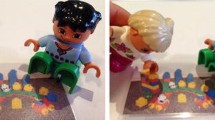Abstract
This study compared the social problem-solving skills of 57 maladjusted and 57 well adjusted first and second graders in a series of hypothetical and actual provocations. All children were asked how they would react to four videotaped provocations involving same-age peers. They were also exposed to three provocations simulated by a peer-confederate; their verbal and nonverbal behaviors were videotaped. Multivariate analyses of variance indicated that, overall, maladjusted subjects displayed less assertiveness and more verbal and nonverbal aggressive responses to the actual provocations. Conversely, hypothetical situations yielded few between-group differences with respect to verbal strategies. The validity of hypothetical situations is questioned; the importance of actual situations for assessment and intervention purposes is stressed.
Similar content being viewed by others
References
Asarnow, J. R., & Callan, J. W. (1985). Boys with peer adjustment problems: Social cognitive processes.Journal of Consulting and Clinical Psychology, 53, 80–87.
Asher, S. R. (1983). Social competence and peer status: Recent advances and future directions.Child Development, 54, 427–434.
Becker, R. E., & Heimberg, R. G. (1988). Assessment of social skills. In A. S. Bellack & M. Hersen (Eds.),Behavioral assessment: A practical handbook (pp. 365–395). New York: Pergamon Press.
Behar, L. B., & Stringfield, S. (1974). A behavior rating scale for the preschool child.Developmental Psychology, 10, 601–610.
Campbell, S. B., & Cluss, P. (1982). Peer relationships of young children with behavior problems. In R. H. Rubin & H. S. Ross (Eds.),Peer relationships and social skills in childhood (pp. 323–352). New York: Springer-Verlag.
Coie, J. D., Belding, M., & Underwood, M. (1988). Aggression and peer rejection in childhood. In B. B. Lahey & A. E. Kazdin (Eds.),Advances in clinical child psychology, Vol. 11 (pp. 125–158). New York: Plenum Press.
Coie, J. D., & Dodge, K. A. (1983). Continuities and changes in children's social status: A five-year longitudinal study.Merrill-Palmer Quarterly, 29, 261–282.
Dodge, K. A. (1989). Coordinating responses to aversive stimuli: Introduction to a special section on the development of emotion regulation.Developmental Psychology, 25, 339–342.
Dodge, K. A. (in press). Emotion and social information processing. In J. Garber & K. A. Dodge (Eds.),The development of emotion regulation and dysregulation. New York: Cambridge University Press.
Dodge, K. A., & Feldman, E. (1990). Issues in social-cognition and sociometric status. In S. R. Asher & J. D. Coie (Eds.),Peer rejection in childhood (pp. 119–155). New York: Cambridge University Press.
Dodge, K. A., & Frame, C. L. (1982). Social cognitive biases and deficits in aggressive boys.Child Development, 53, 620–635.
Dodge, K. A., McClaskey, C. L., & Feldman, E. (1985). Situational approach to the assessment of social competence in children.Journal of Consulting and Clinical Psychology, 53, 344–353.
Dodge, K. A., Murphy, R. R., & Buchsbaum, K. (1984). The assessment of intention-cue detection skills in children: Implications for developmental psychopathology.Child Development, 55, 163–173.
Dodge, K. A., Pettit, G. S., McClaskey, C. L., & Brown, M. M. (1987). Social competence in children.Monographs of the Society for Research in Child Development, 51, 1–81.
Dodge, K. A., & Somberg, D. R. (1987). Hostile attributional biases among aggressive boys are exacerbated under conditions of threats to the self.Child Development, 18, 213–224.
Fowler, P. O., & Park, R. M. (1979). Factor structure of the Preschool Behavior Questionnaire in a normal population.Psychological Reports, 45, 599–606.
Frederiksen, L. W., Jenkins, J. O., Foy, D. W., & Eisler, R. M. (1976). Social-skills training to modify abusive verbal outbursts in adults.Journal of Applied Behavior Analysis, 9, 117–125.
Gesten, E. L., Rains, M. H., Rapkin, B. D., Weissberg, R. P., Flores de Apodaca, R., Cowen, E. L., & Bowen, R. (1982). Training children in social problem-solving competencies: A first and second look.American Journal of Community Psychology, 10, 95–115.
Gesten, E. L., Weissberg, R. P., Amish, P. L., & Smith, J. K. (1987). Social problem-solving training: A skills-based approach to prevention and treatment. In C. A. Maher & J. E. Zins (Eds.),Psychoeducational interventions in the schools (pp. 26–45). New York: Pergamon Press.
Gottman, J. M. (1987). Merging social cognition and social behavior.Monographs of the Society for Research in Child Development, 51, 81–85.
Harris, M. B., & Siebel, C. E. (1975). Affect, aggression, and altruism.Developmental Psychology, 11, 623–627.
Hersen, M., & Bellack, A. S. (1977). Assessment of social skills. In A. R. Ciminero, K. S. Calhoun, & H. E. Adams (Eds.),Handbook for behavioral assessment (pp. 509–554). New York: Wiley.
Hoge, R. D., Meginbir, L., Khan, Y., & Weatherall, D. (1985). Multitrait-multimethod analysis of the Preschool Behavior Questionnaire.Journal of Abnormal Child Psychology, 13, 119–127.
Hughes, J. N., Boodoo, G., Alcala, J., Maggio, M.-C, Moore, L., & Villapando, R. (1989). Validation of a role-play measure of children's social skills.Journal of Abnormal Child Psychology, 17, 633–646.
La Greca, A., & Stark, P. (1986). Naturalistic observation of children's social behavior. In P. S. Strain (Eds.),Children's social behavior (pp. 181–214). Orlando: Academic Press.
Lochman, J. E., & Lampron, L. B. (1986). Situational social problem-solving skills and selfesteem of aggressive and nonaggressive boys.Journal of Abnormal Child Psychology, 14, 605–617.
McClure, L. F. Chinsky, J. M., & Larsen, S. W. (1978). Enhancing social problem-solving performance in an elementary school setting.Journal of Educational Psychology, 70, 504–513.
Mize, J., & Cox, R. A. (1990). Social knowledge and social competence: Number and quality of strategies as predictors of peer behavior.Journal of Genetic Psychology, 151, 117–127.
Mize, J., & Ladd, G. W. (1988). Predicting preschoolers' peer behavior and status from their interpersonal strategies: A comparison of hypothetical-reflective and enactive assessments.Developmental Psychology, 24, 782–788.
Moller, L. C., & Rubin, K. H. (1988). A psychometric assessment of a two-factor solution for the Preschool Behavior Questionnaire in mid-childhood.Journal of Applied Developmental Psychology, 9, 167–180.
Parker, J. G., & Asher, S. R. (1987). Peer relations and later personal adjustment: Are lowaccepted children at risk?Psychological Bulletin, 102, 357–389.
Perry, D. G., Perry, L. C., & Rasmussen, P. (1986). Cognitive social learning mediators of aggression.Child Development, 57, 700–711.
Peters, R. de V., Bernfeld, G. A., Bradley, E. J., & Walters, J. E. (July, 1983).Cognitive and motivational factors in aggressive boys. Paper presented at the Meetings of the International Society for the Study of Behavioral Development, Munich.
Putallaz, M., & Gottman, J. (1983). Social relationship problems in children. In B. B. Lahey & A. E. Kazdin (Eds.),Advances in clinical child psychology, 6, (pp. 1–43). New York: Plenum Press.
Rickel, A. U., & Burgio, J. C. (1982). Assessing social competencies in lower income preschool children.American Journal of Community Psychology, 10, 635–645.
Rubin, K. H., & Krasnor, L. R. (1986). Social cognitive and social behavioral perspectives on problem solving. In M. Perlmutter (Ed.),The Minnesota Symposium on Child Psychology, 18 (pp. 1–68). Hillsdale, NJ: Erlbaum.
Rubin, K. H., Moller, L., & Emptage, A. (1986). The Preschool Behaviour Questionnaire: A useful index of behaviour problems in elementary school-age children?Canadian Journal of Behavioral Science, 19, 86–100.
Rutter, M. (1987). A children's behavior questionnaire for completion by teachers: Preliminary findings.Journal of Child Psychology and Psychiatry, 8, 1–11.
Shantz, C. U. (1985). Conflicts between children: Social cognitive and sociometric correlates. In M. W. Berkowitz (Ed.),Peer conflict and psychological growth (pp. 3–22). San Francisco: Jossey-Bass.
Shantz, C. U. (1987). Conflicts between children.Child Development, 58, 283–305.
Shantz, D. W. (1986). Conflict, aggression, and peer status: An observational study.Child Development, 57, 1322–1332.
Spence, S. H. (1987). The relationship between social-cognitive skills and peer sociometric status.British Journal of Developmental Psychology, 5, 347–356.
Tremblay, R. E., Desmarais-Gervais, L., Gagnon, C., & Charlebois, P. (1987). The Preschool Behaviour Questionnaire: Stability of its factor structure between cultures, sexes, ages and socioeconomic classes.International Journal of Behavioral Development, 10, 467–484.
Vitaro, F., Bouchard, J., Diotte, M., & McCaughry, D. (1988). Situations sociales a potentiel conflictuel et caractéristiques socio-cognitives d'enfants agressifs et rejetés [Social problem situations and social-cognitive characteristics of aggressive-rejected children].International Journal of Psychology, 23, 24–48.
Vitaro, F., Pelletier, D., & Coutu, S. (1989a). Stratégies de résolution de problèmes sociaux hypothétiques: Impact de provocations réelles sur les réponses d'enfants en début de scolarisation [Influence of provocations on the social problem-solving skills of young SCHOOL children].Revue Internationale de Psychologie Sociale, 2, 513–529.
Vitaro, F., Pelletier, D., & Coutu, S. (1989b). Impact of a negative social experience on the social reasoning process of aggressive-rejected children.Perceptual and Motor Skills, 69, 371–382.
Vitaro, F., Tremblay, R. E., Gagnon, C., Piché, C., & Royer, N. (1988). Évaluation par les pairs á l'école maternelle des difficultés de comportement [Peer assessment of behavioral difficulties in kindergarten]. In P. Durning & R. E. Tremblay (Eds.),Relations entre enfants: Recherches et interventions éducatives (pp. 271–308). Paris: Fleurus.
Weir, K., & Duveen, G. (1981). Further development and validation of the Prosocial Behaviour Questionnaire four use by teachers.Journal of Child Psychology and Psychiatry, 22, 357–374.
Author information
Authors and Affiliations
Additional information
This research was funded by the Conseil Québécois de Recherche Sociale. We thank the authorities and directors of the Outaouais-Hull and Aylmer School Boards as well as the first- and second-grade teachers and children for their collaboration. Josée Bouchard, Doreen McCaughry, Michel Diotte, Elizabeth Ruel, David Cuthill, and Alain Gendron also deserve our thanks for their participation in the collection or analysis of the data.
Rights and permissions
About this article
Cite this article
Vitaro, F., Pelletier, D. Assessment of children's social problem-solving skills in hypothetical and actual conflict situations. J Abnorm Child Psychol 19, 505–518 (1991). https://doi.org/10.1007/BF00925817
Revised:
Issue Date:
DOI: https://doi.org/10.1007/BF00925817




